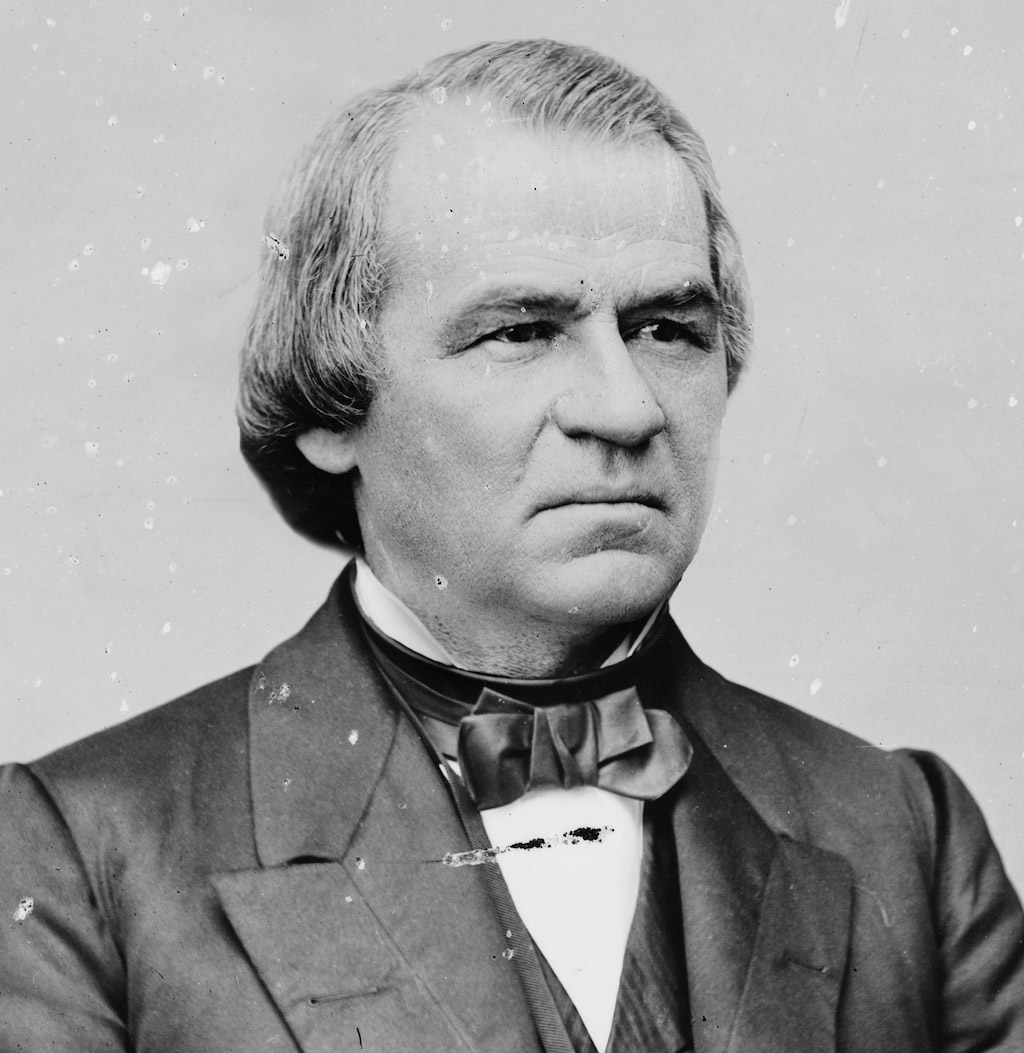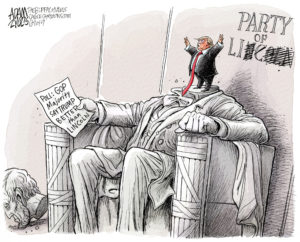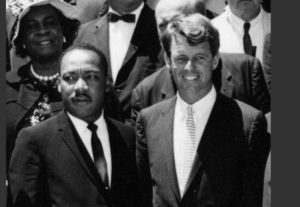The Second Coming of Andrew Jackson or Andrew Johnson?
President Trump’s pardon of Joe Arpaio was made possible by a previous president’s pardoning of ex-Confederates. Andrew Johnson, the 17th president of the United States. (Wikimedia)
Andrew Johnson, the 17th president of the United States. (Wikimedia)
This piece first appeared on Black Agenda Report.
Donald Trump identifies most closely with America’s hyper-aggressive “outlaw” presidents, especially Andrew Jackson, arguably the most hands-on violent and law-defying chief executive in U.S. history. As a general, Jackson repeatedly violated Spanish sovereignty in Florida in his expeditions against Native American and Black resistance to the ever-expanding U.S. slavocracy. As the 7th president, Jackson ignored a U.S. Supreme Court decision that recognized the sovereignty of the Cherokee Nation. “[Chief Justice] John Marshall has made his decision; now let him enforce it,” said Jackson, mocking the judiciary’s lack of an army.
Trump admires Jackson’s savage racism and ruthlessness—as did majorities of U.S. voters of the era. The Orange Oligarch doubtless thinks of Jackson as a “winner,” which is all that counts in Trump’s cutthroat capitalist world. However, Trump himself is looking more like a “loser” president with every passing day—more like the other “A.J.” in the White House, Andrew Johnson, who escaped impeachment by only one vote, in 1868.
Although most analysts believe Trump is on safe legal ground in his pardoning of arch-racist former Arizona sheriff Joe Arpaio, impeachment is ultimately a political act. The Republican Party does control both Houses of Congress, but it’s not Donald Trump’s party. Rather, it’s the same GOP whose entire pantheon of top politicians Trump defeated in the 2016 primaries (with extraordinary assistance from corporate media and the Democratic National Committee, as revealed by WikiLeaks). These Republicans detest Trump, who continues to harangue and bully them with tweets and ad-lib outbursts that will someday soon come home to roost.
The Arpaio pardon has further eroded Trump’s support among the majority party on Capitol Hill. New Jersey Governor Chris Christie, who boarded the Trump train during the primaries when he discovered that the billionaire was even better than him at riling up racists, has distanced himself from Trump’s latest gambit. House Speaker Paul Ryan said he opposed the pardon, as did both of Arizona’s Republican senators.
Republican Senate majority leader Mitch McConnell let it be known, last week, that he despairs of Trump’s ability to salvage his presidency—which is another way of saying that McConnell will not be the one to throw Trump a life jacket when the crisis comes. McConnell reportedly “expressed horror” at Trump’s moral equation of white supremacists and anti-racist protesters in Charlottesville, Virginia.
White supremacy was the Daddy Trump’s guiding business principle and the spoiled son’s trampoline to fame in New York City politics, and it will likely be the agent of The Donald’s presidential demise. He inherited the broad—near absolute—powers of pardon from President Andrew “The Loser” Johnson, the vice president and Tennessee Democrat who succeeded the assassinated Lincoln and immediately set about the wholesale pardoning of Confederates. Augustus Hill Garland, a former Arkansas senator in the Confederate States of America, and once a supporter of the “Know Nothing” party, immediately re-entered politics, but was prohibited by federal legislation from practicing law. In 1866, the U.S. Supreme Court—which until only two years before had been presided over by Chief Justice Roger B. Taney, of Dred Scott decision infamy—ruled that Johnson and all U.S. presidents had almost unlimited powers to pardon; a gift to ex-Confederates throughout the South.
Johnson’s mass rehabilitation of rebels allowed them to almost instantaneously form ex-Confederate governments all over Dixie, legislating Black Codes that negated Emancipation and prompted the Radical Republican Congress to pass amendments to the Constitution and impose a Reconstruction regime on the South to protect the freedmen and women. Johnson fought the Radical Republicans every step of the way, repeatedly vetoing civil rights legislation and economic aid for the ex-slaves. The issue came to a head in 1868, when Johnson escaped impeachment by one vote.
Reconstruction ended early in Arkansas, where Garland was elected as Governor in 1872. He became a U.S. Senator in 1876, the year of the Hayes-Tilden Compromise that resulted in the withdrawal of federal troops from the South, ushering in Jim Crow, the world’s most regimented racial regime. In 1885, Garland became attorney general of the United States under Democratic President Grover Cleveland, of Illinois, who ruled in concert with a Republican-dominated Congress. Garland’s story personifies the reconciliation of white people, North and South, around the principle of Negro subordination.
Garland may now have played a role, through the Supreme Court decision on pardons that bears his name, in the dissolution of Donald Trump’s regime—through excess of Confederateness. The international corporate elite of both parties have no use for the symbolism and crude language of the Confederacy and Jim Crow. This tiny, overwhelmingly white fraction of one percent rules through the hegemony of capital, the corporate ownership of the means of communication, the world’s biggest police and prisons state, and a war machine that can destroy the planet many times over. The day approaches when Trump will be more useful to the Lords of Capital as a foil and ritual sacrifice.
When that day arrives, the still-unfree black and brown masses will, of course, celebrate Trump’s demise, in the woefully mistaken belief that the Deep State is finally on their side.
Black Agenda Report executive editor Glen Ford can be contacted at [email protected].
Your support matters…Independent journalism is under threat and overshadowed by heavily funded mainstream media.
You can help level the playing field. Become a member.
Your tax-deductible contribution keeps us digging beneath the headlines to give you thought-provoking, investigative reporting and analysis that unearths what's really happening- without compromise.
Give today to support our courageous, independent journalists.






You need to be a supporter to comment.
There are currently no responses to this article.
Be the first to respond.